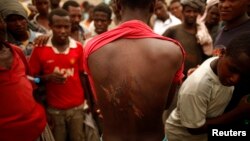DAKAR —
The number of international migrants has increased by more than 40 percent since 2000, to an estimated 214 million people. The complications presented by this increasing flow are challenging border-control authorities worldwide. Officials from 13 Francophone countries in West and Central Africa met to figure out how to better protect the rights of people on the move.
As the number of international migrants continues to rise, the International Organization for Migration (IOM) says it is more important than ever that African governments have the capacity to fight human trafficking and to protect the rights of migrants.
To help West and Central African countries better manage the situation, the IOM organized a two-day workshop in Dakar, which aims to open dialogue and promote cooperation among countries for better border-control management.
IOM Regional Director for West and Central Africa Carmela Godeau spoke to VOA at the opening ceremony Monday. “The workshop today and tomorrow is addressing the issue of irregular migration and the protection of the rights of migrants. What we try to do always is to create partnerships among governments, because migration is a very big challenge of our century, and no state, no government can succeed alone," she explained. "We have to work all together.”
According to the U.N. Department of Economic and Social Affairs, Africa has an estimated 19.3 million international migrants. West African citizens are among the world’s most mobile populations.
Many of these migrants move legally throughout the region as part of an agreement by the Economic Community of West African States that allows “the free intra-regional movement of persons." But the IOM says changing migration patterns and a lack of integrated border management has made it increasingly difficult for law enforcement agencies to control and monitor the flows of migrants.
Godeau said irregular migration -- the crossing of borders without proper documentation and authorization -- is an especially difficult challenge for many countries in the region.
“Why? Because it is sometimes difficult to distinguish between a migrant, a trafficking migrant, a refugee, an asylum seeker," said Godeau. "So we want to help the governments in the regions to build their capacity in this field and, in this way, protect the rights of migrants and vulnerable persons on the move.”
IOM Regional Migrant Assistance Specialist Laura Lungarotti said there are no clear-cut solutions to these issues, but consistent migration laws across the region could help reduce migrant smuggling, a form of transnational organized crime.
Lungarotti warned law enforcement agencies must also protect the rights of people legally on the move, while working to combat smuggling. “The option, if we to try to reform entry procedures, is to be able at the same time, on the one side, to accommodate the states’ interest of regulating entry and residency of their citizens, but on the other side, respecting the rights of those who are traveling, either irregularly or regularly.”
The International Organization for Migration says the workshop will run through Tuesday, but they will continue to work with participants to enact migration management best practices.
As the number of international migrants continues to rise, the International Organization for Migration (IOM) says it is more important than ever that African governments have the capacity to fight human trafficking and to protect the rights of migrants.
To help West and Central African countries better manage the situation, the IOM organized a two-day workshop in Dakar, which aims to open dialogue and promote cooperation among countries for better border-control management.
IOM Regional Director for West and Central Africa Carmela Godeau spoke to VOA at the opening ceremony Monday. “The workshop today and tomorrow is addressing the issue of irregular migration and the protection of the rights of migrants. What we try to do always is to create partnerships among governments, because migration is a very big challenge of our century, and no state, no government can succeed alone," she explained. "We have to work all together.”
According to the U.N. Department of Economic and Social Affairs, Africa has an estimated 19.3 million international migrants. West African citizens are among the world’s most mobile populations.
Many of these migrants move legally throughout the region as part of an agreement by the Economic Community of West African States that allows “the free intra-regional movement of persons." But the IOM says changing migration patterns and a lack of integrated border management has made it increasingly difficult for law enforcement agencies to control and monitor the flows of migrants.
Godeau said irregular migration -- the crossing of borders without proper documentation and authorization -- is an especially difficult challenge for many countries in the region.
“Why? Because it is sometimes difficult to distinguish between a migrant, a trafficking migrant, a refugee, an asylum seeker," said Godeau. "So we want to help the governments in the regions to build their capacity in this field and, in this way, protect the rights of migrants and vulnerable persons on the move.”
IOM Regional Migrant Assistance Specialist Laura Lungarotti said there are no clear-cut solutions to these issues, but consistent migration laws across the region could help reduce migrant smuggling, a form of transnational organized crime.
Lungarotti warned law enforcement agencies must also protect the rights of people legally on the move, while working to combat smuggling. “The option, if we to try to reform entry procedures, is to be able at the same time, on the one side, to accommodate the states’ interest of regulating entry and residency of their citizens, but on the other side, respecting the rights of those who are traveling, either irregularly or regularly.”
The International Organization for Migration says the workshop will run through Tuesday, but they will continue to work with participants to enact migration management best practices.
